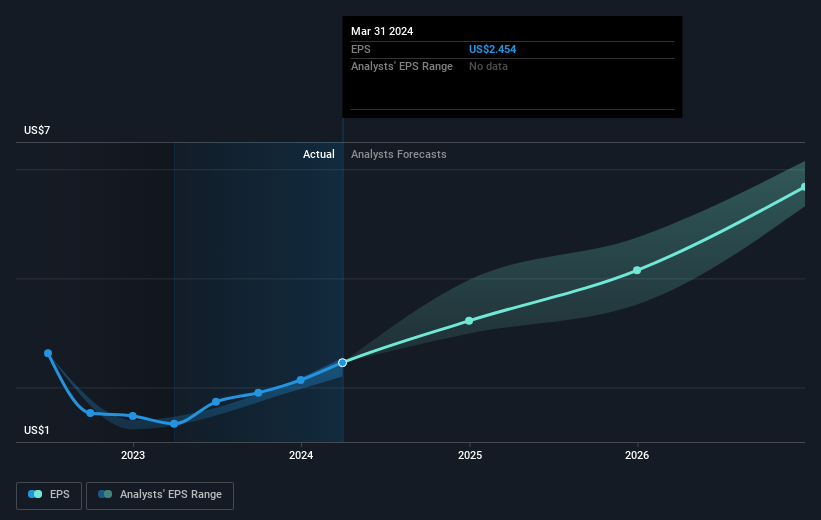Halozyme Therapeutics (NASDAQ:HALO) shareholder returns have been stellar, earning 193% in 5 years
The worst result, after buying shares in a company (assuming no leverage), would be if you lose all the money you put in. But on the bright side, if you buy shares in a high quality company at the right price, you can gain well over 100%. For example, the Halozyme Therapeutics, Inc. (NASDAQ:HALO) share price has soared 193% in the last half decade. Most would be very happy with that. On top of that, the share price is up 29% in about a quarter.
The past week has proven to be lucrative for Halozyme Therapeutics investors, so let's see if fundamentals drove the company's five-year performance.
See our latest analysis for Halozyme Therapeutics
To quote Buffett, 'Ships will sail around the world but the Flat Earth Society will flourish. There will continue to be wide discrepancies between price and value in the marketplace...' By comparing earnings per share (EPS) and share price changes over time, we can get a feel for how investor attitudes to a company have morphed over time.
During the last half decade, Halozyme Therapeutics became profitable. Sometimes, the start of profitability is a major inflection point that can signal fast earnings growth to come, which in turn justifies very strong share price gains. Since the company was unprofitable five years ago, but not three years ago, it's worth taking a look at the returns in the last three years, too. We can see that the Halozyme Therapeutics share price is up 12% in the last three years. In the same period, EPS is up 28% per year. This EPS growth is higher than the 4% average annual increase in the share price over the same three years. So you might conclude the market is a little more cautious about the stock, these days.
You can see how EPS has changed over time in the image below (click on the chart to see the exact values).
We know that Halozyme Therapeutics has improved its bottom line lately, but is it going to grow revenue? Check if analysts think Halozyme Therapeutics will grow revenue in the future.
A Different Perspective
We're pleased to report that Halozyme Therapeutics shareholders have received a total shareholder return of 48% over one year. That's better than the annualised return of 24% over half a decade, implying that the company is doing better recently. In the best case scenario, this may hint at some real business momentum, implying that now could be a great time to delve deeper. It's always interesting to track share price performance over the longer term. But to understand Halozyme Therapeutics better, we need to consider many other factors. Consider for instance, the ever-present spectre of investment risk. We've identified 2 warning signs with Halozyme Therapeutics , and understanding them should be part of your investment process.
Of course, you might find a fantastic investment by looking elsewhere. So take a peek at this free list of companies we expect will grow earnings.
Please note, the market returns quoted in this article reflect the market weighted average returns of stocks that currently trade on American exchanges.
Have feedback on this article? Concerned about the content? Get in touch with us directly. Alternatively, email editorial-team (at) simplywallst.com.
This article by Simply Wall St is general in nature. We provide commentary based on historical data and analyst forecasts only using an unbiased methodology and our articles are not intended to be financial advice. It does not constitute a recommendation to buy or sell any stock, and does not take account of your objectives, or your financial situation. We aim to bring you long-term focused analysis driven by fundamental data. Note that our analysis may not factor in the latest price-sensitive company announcements or qualitative material. Simply Wall St has no position in any stocks mentioned.
Have feedback on this article? Concerned about the content? Get in touch with us directly. Alternatively, email editorial-team@simplywallst.com

 Yahoo Finance
Yahoo Finance 
